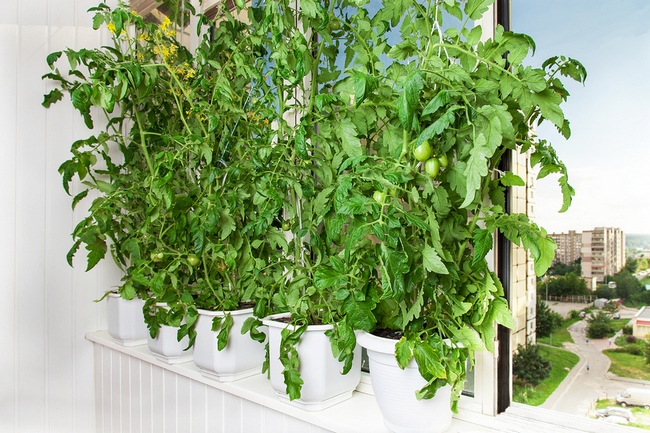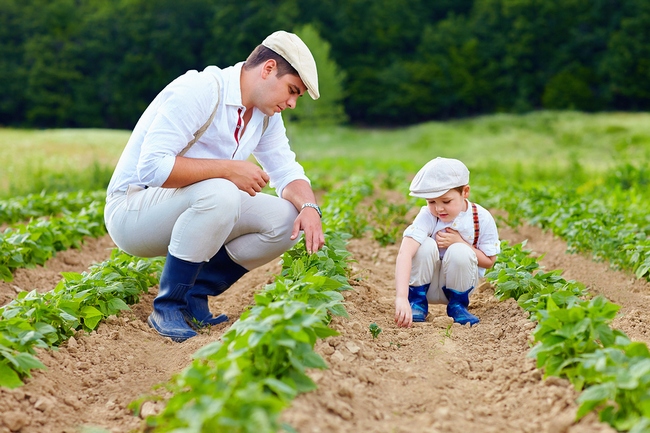- Make It Yourself Lavender Heart-Shaped Bath Bombs!
- 20 Things You Never Knew About “Down There”
- 12 Best Foods For Those Suffering From Arthritis Pain
- 12 Personal Hygiene Mistakes Almost Everyone Makes (Mom Never Told You About #4!)
- 15 Medicinal Plants And Herbs From The Cherokee People
- 12 Mind-Blowing Benefits Of Drinking Coconut Water During Pregnancy
- 12 Outstanding Winter Foods That Won’t Fatten You Up Like A Christmas Turkey
10 Tips for Urban Homesteaders

Photo credit: bigstock
You can enjoy the fruits of your labor as well as return to a simpler way of life even if you don’t live in a rural area. Many people now living in cities and suburbs are learning how to live a lifestyle of self-sufficiency without ever leaving home.
If you would like to grow your own organic produce in your backyard or learn to work a bee garden, then keep reading. Urban homesteading offers a more independent way of life, even if you are miles from a ranch or don’t own any farmland.
Read on about our top 10 ways you can begin to become urban homesteaders and live more freely.
1. Grow your own food
There are literally hundreds of websites that will tell you how you can grow your own food, even if you live in an apartment. Mother Earth News is a good example; they encourage people to grow their own organic foods. You can learn how to grow beans in coffee cans, herbs on a windowsill, potatoes in a trash can. There are websites with information on how to grow your own miniature fruit tree orchard or helping Monarch butterflies by planting the flowering herbs that they need. Find out what you can plant and grow no matter how big or how little land you have. Start a garden in your kitchen in the late winter or early spring and then transplant your seedlings into your yard. There is no end to the information that’s out there if you are willing to invest a little time. There is nothing that can beat growing and eating your own food. Do it for one season and you will find that you are hooked.
2. Observe, Reflect, Then Act
By observing your surroundings and learning what you can from nature, you can glean some very important information that will help you in your efforts to homestead. Although most people are anxious to just jump right in and get started, you will find that you will better results if you take a little time and think about what your long term goals are before you actually take action (read more how to meditate easily). When you do this you will find that you avoid many mistakes, perhaps even some very costly mistakes. For example, if you are dying to start a Bing cherry orchard and you spend hundreds of dollars buying saplings, and endless hours planting them, only to find out that Bing cherry trees won’t grow in your area. This is just one example of the type of gung-ho action you want to avoid. Once you become familiar with your place and then set some goals, you can act with the confidence that comes from wisdom.
3. Think about becoming re-skilled
If you want to be more independent, then you need to start becoming well trained in the skills that are necessary to homesteading. This would include things like fixing a bicycle, knitting socks, sewing clothes from patterns, making soap, canning or other methods of preserving food, etc. These are extremely valuable skill that not only save you money, but will allow you to make the move from consumers to producers. These kinds of skills will reconnect you with your past and your ancestors. Find out more about these skills from the wide range of knowledge that is usually available for free in many cities. Ask your elders about how they did things “in the old days”, ask about an apprenticeship, and attend workshops or lectures, volunteer for community projects where you can learn from others, or read books from your library. Imagine what you would need to know if you were cut off from the outside world and then begin to acquire those skills one at a time.
4. Try living without your car
Even if you truly do need a car for work, then at least try an experiment where you leave your car at home on weekends. Or try leaving it at home for one week and see how you would manage without it. What did you learn after that experiment? Did you end up talking to more people as a result? Did you feel more energized or more exhausted? Were you super stressed out or were you calmer? Even if you decide you can’t do without your car right now, you should become familiar with other forms of transportation such as bike paths, bus routes, carpooling, car sharing, and walking paths. Think about what you would do if all cars were suddenly banned or unavailable for some reason? Knowing your options in advance is the smartest action to prevent chaos or excessive stress during emergencies. Also, when you make a conscious effort to do without your car whenever possible you not only save money, but you help save mother earth just a little bit more.
5. Make it yourself and Make do
Try to think beyond the usual reducing, reusing, and recycling adage. Add new words to that mantra including repairing, reinventing, restoring, and reviving. Perhaps the most important one would be refraining. Refrain from buying stuff you don’t need. Refrain from becoming trapped in the endless consumerism trap that America has fallen into. Do you really need the latest cell phone if you old one works fine? Do you really need a Smart TV? A new laptop? A new washing machine with 26 wash cycles? Seriously? Your grandmother probably used to wash by hand or used a washing machine with two cycles, regular and delicate, and she seemed to get along just fine. THINK before you buy anything and ask yourself, do I really need this? Try repairing things instead of just buying new ones. Try making things yourself like home cleaners, clothes, and beauty products. Wear last year’s dress to the Christmas party again. No one will notice if you have an iPhone 4 or 6 unless you tell them.
Continue to Page 2

Photo credit: bigstock
6. Reduce Your Energy Consumption
Do you know how much energy your home consumes every month? Many gas and electrical companies will do energy checks/comparison charts at no charge. Find out what the major sources of electrical consumption are inside your home. Once you know which appliances use the most electricity, you can use them more wisely. Washers, refrigerators, clothes dryers, heaters, older furnaces, freezers, and air conditioners can all be huge energy hogs. Find ways to avoid using these appliances as much as possible by doing things the old fashioned way. Wash only full loads with cold water. Keep refrigerators and freezers on the lowest setting possible and as full as possible. If you need to take up extra space, fill empty plastic bottles, such as milk cartons, with water. Dry clothes outside on a clothesline as much as possible. Use fans more and air conditioning less. Put extra blankets on the bed and wear warmer clothes inside the house so you can turn the thermostat on the heater down.
7. Involve your children
Living a homesteading lifestyle is absolutely filled with the potential for educational opportunities that can include a lot of fun when the entire family is involved. Give your children their own tasks that are entirely theirs and allow your children to become a part of the homesteading life. Even very small children can feed chickens and collect eggs, water garden plants, and pick fruit from the ground. Teach them how to plant seedlings and ask for their help with whatever project you are working on. Older children can learn to cook and bake bread, care and clean up after livestock, do work in the garden, and learn how to make simple repairs. Yes, you might have to re-do a few plantings or tidy up after your children “help” you out, but this is how they become inspired to continue working on their own. Many people find that it helps if they buy some child sized tools so the work is easier for their smaller hands. Kids love to harvest what they have grown. Give them their own harvest basket and let them, literally, pick the fruit of their labors. Watch how they smile!
8. Engage the community
Although urban homesteading is about learning how to be more independent, it’s not about complete self-sufficiency. There is nothing better than building a network of community minded people, with a wide range of skills and resources, which are willing to share their knowledge with other community members. Urban homesteading works best when people in a community know that they can rely on one another if the need arises. Think about the Amish if you want to have a better idea about what urban homesteading is really like. Everyone in the community has very diverse abilities and through a co-operative lifestyle, everyone can flourish. Think of everyone in your community as a unique as well as valuable human being, just as you are. When people in a community help one another, you usually find that this is the best way to help yourself, too. Think of homesteading as the new “old fashioned” way of living.
9. Learn how to preserve food
After growing your own food, you should also learn the art of preserving food for the future. So when you find you have a huge, bumper crop of cucumbers, or tons of onions, you don’t have basketfuls of fruit or veggies rotting in a matter of weeks. This is why your great grandmother and even your grandmother learned to freeze-dry, dehydrate, and can foods so they can be enjoyed for much longer periods of time. Ask your grandmother or friends who know how to do these preservation techniques, or go online. There are many websites with detailed, step by step instructions on how to preserve food. Who wouldn’t want to eat canned peach pies in December or some preservative free strawberry jam all year long? These aren’t extremely difficult skills and almost everyone can pick them up with just a little practice. Imagine eating your own organic, non-GMO foods all year long? Find out dirty produce items you should avoid.
10. Work with joy and enthusiasm
During the challenging hustle and bustle of everyday life on the homestead front, we should always take a few moments to remember that we need to take some time out to celebrate. We should work mindfully and never forget to include elements of beauty and/or art in our lives. Always start your day with the enthusiasm of a child. Think of everyday as a new day, not just a continuation of the old same old same old. It’s good to remember, also, that we should never compare ourselves to others. If you look at friends who have their new BMW, the latest iPhone, and the biggest home entertainment center available and think that, somehow, we aren’t doing “as well” then you need to change your mindset. If we do our work with joy and a light heart, we will find that taking care of long term goals are enjoyable, as well as sustainable, and perhaps we will inspire others to join us in our quest for a more self-sufficient, simpler way of life.
Sources:

































